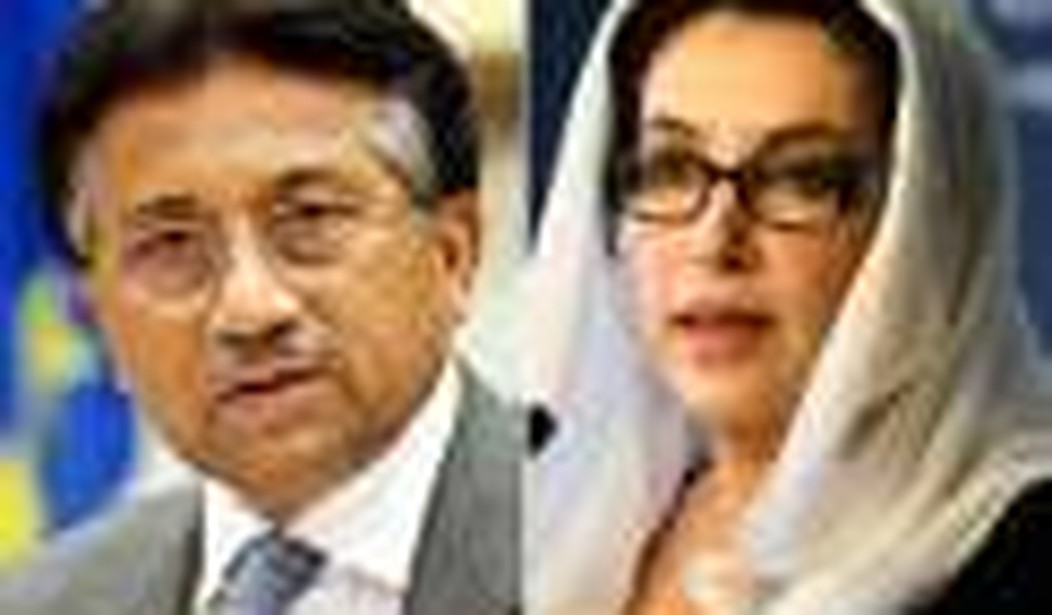Pakistan is an increasingly tense and uncertain place. Over the past week, the government has arrested top opposition leaders without filing formal charges and taken them to Adyala Jail. The moves are clearly designed to stop them from making any significant move before the presidential elections, scheduled for 6th October 2007 that could prevent the re-election of Pervez Musharraf.
Already, the opposition has already filed a petition in the Supreme Court, challenging the legality of Musharraf’s bid for another term as President. The core of their argument challenges his ability to hold two offices simultaneously, those of the President and Army Chief of Staff, arguing that it is unconstitutional.
Through his lawyers, the President has promised the court that “if he is elected as President”, he would step down as Chief of Staff. Many view this as an indirect threat to the courts and the opposition.
This month, the country has entered a volatile phase that observers have been predicting for many months. Anger and annoyance at Musharraf is the mood on the street. The average Pakistani will tell you that the regime is taking increasingly illegal steps with the sole aim of hanging onto for the next five years.
Opposition parties are threatening to resign from the parliament – which would be a symbolic but significant step without directly threatening to the regime.
A real threat would come if one of the provincial assemblies were dissolved prior to Presidential election — provincial assemblies form a vital part of the President’s Electoral College. Fazlur Rahman’s JUI, a right-wing religious party and a component of the opposition alliance, controls the assembly in the NWFP province. Still, JUI is widely considered as “friendly” and “compliant” opposition to Musharraf. Their expected decision in the next few days will determine the course of events on this front.
JUI is not the only opposition party that could potentially create a dent in the opposition’s campaign. Benazir Bhutto’s People’s Party is also signaling that it may strike a deal with Musharraf in return for power sharing.
It is widely believed that the deal could entail Bhutto allowing General Musharraf to win the presidential election if all corruption cases against her are be dropped and she would be offered the seat of Prime Minister once again. Although the government declares that no deal has been or be made with Bhutto, the citizens of Pakistan don’t really believe it. As time passes, and the various parties continually flip-flop on key issues, the public suspects that an understanding has already been reached between Musharraf and Benazir.
Pakistanis have lost any trust in their leaders – and believe that games are being played with their constitution and laws. Made cynical by dictatorship, their distrust the regime and the opposition equally, viewing all political leadership as self-serving.
But while the various elements of government appear to be flouting the law, there is a force – which includes lawyers and civil society – that are trying to keep meaning in the nation’s rules and regulations. The Bar Association has named Justice (retired) Wajih ud-din Ahmed as their candidate for Presidency. Justice Wajih has an impeccable reputation and is widely respected.
The lawyers’ plan is that if Supreme Court decides against the opposition petition in court, and does not rule against Musharraf, their candidate, Justice Wajih-ud-din Ahmed will continue to fight the legal battle before the Election Commission.
The tensions and pressures on the lawyers’ community are clear. Two lawyers that were leading the struggle against Musharraf in Karachi were shot dead recently. Another lawyer sprayed black paint on a prominent government lawyer, Reza Kasuri’s face. A day earlier, Kasuri had used highly abusive language on television against Munir A Malik, president of Supreme Court Bar Association.
Battle lines are being drawn. Every step that Musharraf and the government takes that appears illegal or brutal swings public sympathy towards his opposition.
The struggle is challenging and complicated, as all of the players on Pakistan’s political game plot their strategies as carefully as chess competitors planning their next move.
The question remains whether the power of dictatorship will triumph or the written law of the land – and whom the end result will benefit.









Join the conversation as a VIP Member